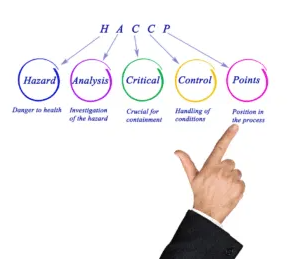Food safety is not just a regulatory requirement—it’s the backbone of trust between businesses and consumers. In today’s competitive food industry, a single mistake in compliance can lead to devastating consequences such as product recalls, failed inspections, financial losses, and irreparable brand damage. That’s why many companies are turning to Consultant HACCP experts to ensure their food safety programs meet the highest standards.
This blog will break down everything you need to know about HACCP, the role of a consultant, when to hire one, and how expert support can strengthen your food safety program.
What is HACCP?
HACCP, which stands for Hazard Analysis Critical Control Point, is a systematic and science-based approach to food safety. It identifies, evaluates, and controls potential hazards—biological, chemical, or physical—that could compromise the quality and safety of food.
Globally recognized and often mandated by governments, HACCP is a cornerstone of food safety management. In Canada, compliance with HACCP is often a requirement for manufacturers, processors, distributors, and food service businesses.
A HACCP plan ensures that food is safe for consumers and that businesses can consistently meet regulatory, retailer, and customer expectations.
Why HACCP matters:
-
Prevents foodborne illness and contamination
-
Ensures compliance with Canadian and international regulations
-
Builds consumer trust and loyalty
-
Helps businesses pass audits from government bodies and major retailers
Without HACCP, businesses put themselves at risk of enforcement actions, costly recalls, and reputational damage.
What Does a Consultant HACCP Do?
While HACCP may sound straightforward, developing and maintaining a compliant program can be complex. This is where a Consultant HACCP steps in.
A consultant provides specialized knowledge and hands-on expertise to help businesses design, implement, and sustain HACCP systems. Their role typically includes:
-
Gap assessments: Reviewing existing processes and identifying compliance risks
-
Custom HACCP plans: Developing or revising HACCP programs tailored to your facility and products
-
Staff training: Educating employees on HACCP principles and how to apply them in daily operations
-
Audit preparation: Ensuring documentation, procedures, and facilities are ready for inspections
-
Ongoing support: Updating HACCP plans as operations expand or regulations change
In short, a consultant acts as both a compliance advisor and a risk manager—helping you avoid costly mistakes while ensuring your food safety system is audit-ready.
Benefits of Hiring a Consultant HACCP
Working with a consultant brings several advantages to your food business:
1. Compliance Confidence
Navigating food safety regulations can be overwhelming. A consultant ensures your HACCP plan aligns with Canadian and international requirements, including GFSI-recognized standards like SQF or BRC.
2. Time and Cost Savings
Trying to develop a HACCP plan internally often takes more time and resources than anticipated. Consultants streamline the process, saving you from trial-and-error approaches that could delay approvals or lead to costly revisions.
3. Audit Readiness
Government inspections, retailer audits, and third-party certifications all require strong documentation and processes. A consultant ensures your business is fully prepared, reducing stress and improving success rates.
4. Enhanced Food Safety Culture
A consultant provides practical training, empowering your staff to implement HACCP effectively. This builds a stronger food safety culture within your organization.
5. Risk Reduction
By identifying hazards, monitoring critical control points, and creating detailed procedures, consultants help minimize the risk of contamination, recalls, fines, and reputational harm.
When Should You Hire a Consultant HACCP?
Not every business needs a consultant at all times, but there are key situations where hiring one makes sense:
-
Launching a new food business: A HACCP plan is essential from day one.
-
Preparing for certification: If aiming for HACCP certification or GFSI-recognized programs like SQF or BRC, expert guidance is crucial.
-
Expanding operations: Growth often requires updated HACCP documentation and new compliance strategies.
-
Facing recurring compliance issues: Repeated inspection failures or corrective actions indicate the need for outside expertise.
-
Introducing new products or processes: Each change requires an updated HACCP assessment and plan.
Common Mistakes Without Expert Guidance
Many businesses try to handle HACCP compliance internally but encounter challenges such as:
-
Developing generic plans not tailored to the facility
-
Poorly organized or missing documentation
-
Failure to update HACCP plans after operational changes
-
Inadequate employee training, leading to non-compliance
-
Confusing HACCP with other food safety standards
These mistakes can result in costly delays, failed audits, and enforcement actions. A consultant helps you avoid these pitfalls by providing clarity and precision.
How Quality Smart Solutions Can Help
At Quality Smart Solutions, our team of Consultant HACCP experts helps businesses achieve compliance with confidence. We offer:
-
Custom HACCP plan development
-
Comprehensive gap assessments
-
Staff training and workshops
-
Audit preparation and support
-
Ongoing compliance management
By partnering with us, you’ll gain peace of mind knowing your food safety program is in expert hands.
Frequently Asked Questions about Consultant HACCP
Is hiring a Consultant HACCP mandatory?
No, it’s not mandatory, but highly recommended if you lack in-house expertise.
Can my staff create a HACCP plan without a consultant?
Yes, but many businesses find it difficult to meet all regulatory requirements. Consultants save time and prevent costly mistakes.
How long does it take to develop a HACCP plan with a consultant?
It depends on the size of your operation, but with expert guidance, the process is often faster and smoother.
Does HACCP compliance apply only to manufacturers?
No. Distributors, food service operators, and even retailers may need HACCP compliance depending on their role in the supply chain.
Conclusion
Food safety is too important to leave to chance. A Consultant HACCP is more than just an advisor—they’re a partner in protecting your consumers, safeguarding your brand, and ensuring regulatory success.
With the right consultant by your side, you can streamline compliance, reduce risks, and focus on growing your business with confidence.
Ready to strengthen your food safety program? Contact Quality Smart Solutions today to connect with a HACCP consultant and build a safer, more compliant future for your business.
- Consultant HACCP | Expert Food Safety & Compliance Support
- Learn how a Consultant HACCP can simplify compliance, reduce risks, and prepare your food business for audits. Partner with experts for safer success.
- Consultant HACCP
Related posts:
No related posts.




